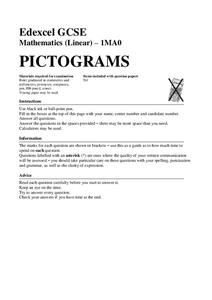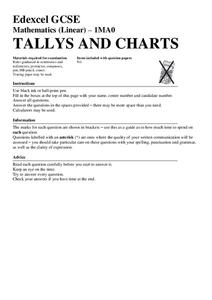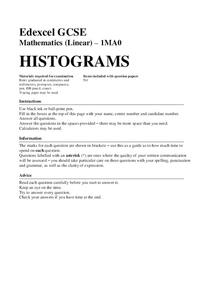Reading Vine
Confucius: The Most Famous Teacher in China
Introduce young philosophers to the wisdom of China's most famous thinkers with a short bio. The reading comprehension passage includes an answer key.
Teacher's Corner
What Is a Foot?
An in-class and at-home assignment, young math stars find and list items from home and school that they think are one foot in length. Once the list is made, provide everyone with rulers to measure and find the actual lengths of their items.
K12 Reader
Measuring Temperature
Fahrenheit? Celsius? What's the difference, and where did these two temperature scales originate? Your pupils will learn all about these topics by reading the passage included here. After reading, individuals respond to five questions...
Mathed Up!
Reading Scales
After watching a video on how to read different types of scales, young mathematicians complete eight problems involving scales. From thermometers to number lines to rulers and clock, class members identify various numbers on scales.
K5 Learning
The Story of Regulus
The great Roman general, Regulus, was known for keeping his word. Read about the extent of his honesty in a reading passage about his imprisonment in Carthage, and assess reading skills with four comprehension questions.
K12 Reader
What’s Your Angle?
Start out with angles by asking your pupils to read this reading passage. Class members will learn about degrees, right angles, acute angles, and obtuse angles and then respond to five questions about the text.
K5 Learning
Damon and Pythias
True friendship is priceless. Fourth graders read a short story about two friends who are willing to give up everything for each other — even their lives.
Read Works
American Government Preamble to the United States Constitution
Observe Constitution Day with a learning exercise that delves deep into the who, what, why, when, where, and how of the U.S. Constitution. Scholars read a short informational text then answer 10 questions—short answer and multiple...
Wordly Wise 3000 Online
Viva Cinco de Mayo
Many people think Cinco de Mayo is the celebration Mexican independence, but they're incorrect. Learn about the battle of Puebla and the victory of General Zaragoza with a short reading passage that includes comprehension and vocabulary...
EngageNY
Grade 10 ELA Module 4: Unit 3, Lesson 1
Is it better to be loved or feared? Using the resource, scholars explore Machiavelli's nonfiction text, The Prince, and examine the author's ideas about the role of leadership. Pupils also complete a Quick Write to analyze a central idea...
Curated OER
Get a Leg Up
Traveling through space is an amazing experience, but it definitely takes a toll on the body. After reading an article and watching a brief video, learners perform an experiment that simulates the effects of zero gravity on the...
Mathed Up!
Pictograms
Young mathematicians read, interpret, and complete a variety of real-world pictograms. Each question includes a key and information to complete the graphs.
EngageNY
Grade 10 ELA Module 4: Unit 3, Lesson 4
According to Machiavelli, a good ruler does whatever it takes. Using the resource, scholars work in small groups to analyze quotes from The Prince and then participate in a whole-class discussion. To finish, pupils select a phrase and...
Prestwick House
Macbeth
Double the enjoyment of the Scottish play with a crossword puzzle based on Shakespeare's Macbeth. The activity tasks readers to identify characters and events and to fill in the missing words from Shakespeare's tragedy about the...
Mathematics Vision Project
Module 6: Congruence, Construction, and Proof
Trace the links between a variety of math concepts in this far-reaching unit. Ideas that seem very different on the outset (like the distance formula and rigid transformations) come together in very natural and logical ways. This...
Mathed Up!
Tallys and Charts
After watching a brief instructional video, young mathematicians are put to the test. By completing and reading frequency tables, tally charts, and bar graphs, individuals show their understanding of how to interpret data.
Mathed Up!
Negative Numbers
Individuals read tables with temperatures and times in order to distinguish the town with the lowest temperature or most extreme temperature difference. Each of the eight questions has three sub-questions that use the same charts.
Mathed Up!
Mean, Median, Mode, and Range
Learners read a variety of word problems and find the mode, median, range, and mode from a given set of data. If calculators are not desirable, provide the class with notebook paper to work out the equations.
Mathed Up!
Histograms
Class members explore how to read and use histograms by watching a video on creating and analyzing histograms. To finish, the class works on a set of questions that tests these skills.
Mathed Up!
Negative Numbers
Eight independent worksheet pages challenge scholars to solve 12 problems that focus on negative numbers in the context of temperature in degrees of celsius.
Student Handouts
What Year Is It?
This page includes a space to write in the date, but what does the date even mean? And where does it come from? Inform your class about the various calendars and how the Western calendar came into widespread use with an informational...
Mathed Up!
Factors, Multiples, and Primes
Reinforce the concept of factors, multiples, and prime numbers with a 16-problem practice instructional activity. Eight pages offer a variety of problem solving opportunities with clear objectives and tips for...
Curated OER
Introduction to Age of Absolutism
Who were the absolute monarchs of Europe and what effect did they have on their countries? Young historians begin by naming qualities they believe are important for a monarch to possess. They then take notes on four key factors...
Edline
How Did the Unification of Germany Change the Course of World History?
Here you'll find a nice guided notes worksheet on Otto von Bismarck, which details Bismarck's plan to unify Germany, as well as asks learners to analyze his motivations and overall impact.























